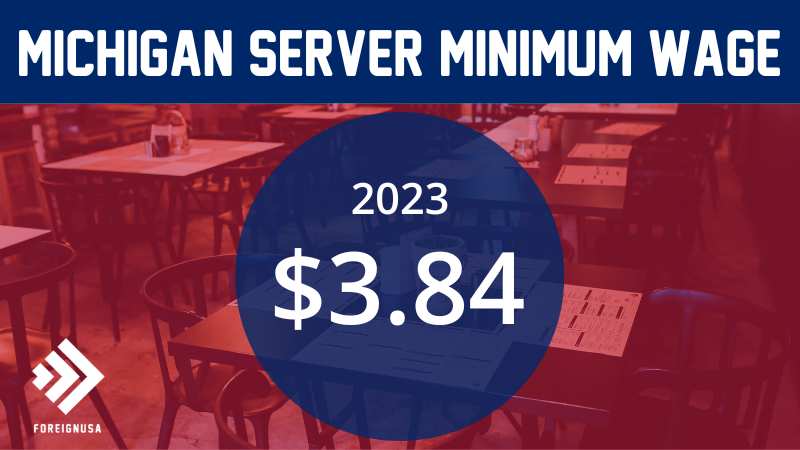If you are a server in Michigan or are considering becoming one, then you should probably know what the minimum wage is for servers in Michigan to see if you are being paid the correct amount, or whether this is a job you would like to do.
The laws surrounding the Michigan minimum wage for servers acts as a safety net for those that may not earn enough in tips to meet the minimum wage threshold in the state.
Servers are those who provide and serve their customers with food and beverages in a restaurant or similar type of business where food and drinks are brought to the table, and as part of this service, a server will typically receive tips (gratuities) for doing so.
Michigan servers usually rely less on their hourly wage and more on the generosity of guests to make a reasonable paycheck.
Michigan Server Minimum Wage 2023
So, what is the minimum wage for a server in Michigan? The minimum cash wage for servers in Michigan is the same as the tipped minimum wage in Michigan, which is $3.84 per hour.
This is the minimum per hour a Michigan server must pay and a Michigan employer must pay its servers.

Server Minimum Wage in Michigan (Minimum Cash Wage and Tip Credits)
$3.84 per hour may sound like a small amount to be paid an hour, but Michigan servers are required to be supplemented by their employers via “tipped credit”, which is, in Michigan’s case, $6.26 per hour, making the server minimum wage in Michigan a total of $10.10 per hour, which is the same as the regular minimum wage in Michigan that applies to all types of employees that work in the state.
Per the tipped minimum wage laws that apply to all states, Michigan employers are required to pay their employees an hourly minimum cash wage with the addition of tip credits.
What tipped credits allow employers to do is pay tipped employees less than the minimum wage so long as they can make up the difference via tips per hour.
Tip credit not only allows server employees to be paid less than the minimum hourly wage, but it is also the same concept with bartenders, hotel workers, airport attendants, and pretty much any job role where tips are the primary income for the employee.
In Michigan, servers must be paid a base minimum cash wage of $3.84 per hour. The expectation is that Michigan servers will make at least an additional $6.26 per hour in tips on average across their work week or pay period, and if they do, then the employer is only obligated to pay a Michigan server $3.84 per hour.
Let’s assume that a server does not make at least $6.26 per hour in tips as an average over the course of their pay period (usually two weeks), then the employer must step in and pay the Michigan server a tip credit of $6.26 per hour, so the server makes a minimum of $10.10 per hour for the duration of the pay period or week that they worked.
Fair Labor Standards Act (FLSA) and Tipped Employees
The Federal Fair Labor Standards Act, also known as the FLSA, is a federal law from the U.S. Department of Labor.
This law establishes a national minimum wage, defines classifications for employees, and covers other essential standards and requirements for employers.
Federal law requires that employers make tipped employees aware of the cash wage paid (currently, the national direct hourly salary is $2.13 per hour), let them know about the tip credit, and explain any tip pooling systems at the workplace.
Because Michigan’s minimum wage rate is higher than the federal minimum wage rate, the state laws supersede the federal regulations.
Michigan Server Minimum Wage History
The table below showcases the current rate and history of the Maryland server minimum wage over the past 15+ years since 2008.
You can see when there were increases in the server minimum wage, which includes not only the tipped minimum wage rates but the tipped credit rates too.
| State | Tipped Server Wage | Tip Credit | Total |
|---|---|---|---|
| Michigan server minimum wage 2023 | $3.84 | $6.26 | $10.10 |
| Michigan server minimum wage 2022 | $3.75 | $6.12 | $9.87 |
| Michigan server minimum wage 2021 | $3.67 | $5.98 | $9.65 |
| Michigan server minimum wage 2020 | $3.67 | $5.98 | $9.65 |
| Michigan server minimum wage 2019 | $3.59 | $5.86 | $9.45 |
| Michigan server minimum wage 2018 | $3.52 | $5.73 | $9.25 |
| Michigan server minimum wage 2017 | $3.38 | $5.52 | $8.90 |
| Michigan server minimum wage 2016 | $3.23 | $5.27 | $8.50 |
| Michigan server minimum wage 2015 | $3.10 | $5.05 | $8.15 |
| Michigan server minimum wage 2014 | $3.10 | $5.05 | $8.15 |
| Michigan server minimum wage 2013 | $2.65 | $4.75 | $7.40 |
| Michigan server minimum wage 2012 | $2.65 | $4.75 | $7.40 |
| Michigan server minimum wage 2011 | $2.65 | $4.75 | $7.40 |
| Michigan server minimum wage 2010 | $2.65 | $4.75 | $7.40 |
| Michigan server minimum wage 2009 | $2.65 | $4.50 | $7.40 |
| Michigan server minimum wage 2008 | $2.65 | $4.50 | $7.40 |
Average Server Salary in Michigan (2023)
We have covered the minimum cash wage that an employer must pay a Michigan server of $3.84 per hour, and we have also detailed the safety net for the server should they not make at least $10.10 per hour with tips by receiving tipped credit of $6.26 per hour. What we have not discussed is the average pay for server employees in Michigan.
If you are a server or are looking to work as a server in a restaurant or similar service-related business in Michigan, knowing the hourly wage for servers is essential, but knowing what you can expect to earn is even more important.
Most Michigan servers are not going to take a position at a restaurant with the view that they can only earn $10.10 per hour, because based on working 35-40 hours a week, they would only earn about $353-$404 per week, and when you compare this to the cost of living in Michigan, you may struggle to make ends meet.
How much do servers make in Michigan?
The average server hourly wage in Michigan (according to the job website Indeed.com) is $14.79 per hour. So, if you were to work an 8-hour shift or a total of 8 hours in a day across a couple of shifts, you could earn (on average) about $118.32 (8 hrs x $14.79).
If you worked five days per week and rounded your daily pay to $119, then you could earn about $595 per week.
If you took just two weeks off a year and worked for 50 weeks you could earn $29,750. If you decided to take 3 weeks off per year then you could earn 49 x $595 = $29,155 for the year. This, of course, is before Michigan income tax has been deducted.
The above calculations are just averages to give you an idea of what you can earn as a Michigan server.
The most important aspects of how much you can earn will depend on how good you are at your job and what type of food/beverage establishment you work at, and how busy it is.
Also, many people that work at restaurants or similar establishments are willing to work more than 40 hours per week so they may qualify for overtime pay.
If the average food item on the menu is $12-$16 and the restaurant mainly serves wings, burgers, subs, nachos, fries, and similar snack-style food, then the average check for each guest or table will be much less, and therefore, the percentage tip against the total check will result in you earning less per table you serve and you’ll have to serve many tables during your shift.
On the other hand, if you work at a finer dining restaurant or one that is really busy and serves steak, seafood, and other higher-priced menu and beverage items, then you stand to earn more money as the total check for each table you serve will be that much higher and the percentage tip you receive on a higher check will be a lot more.
This, of course, assumes there are fewer servers working too, so each server can earn a healthy amount of tips.
Final Thoughts
The most important takeaway from this is that, as a Michigan employer, it is your responsibility to pay your servers a minimum hourly rate + tip credit that equals or surpasses the Michigan minimum wage in the event that your servers do not earn enough to meet the $10.10 per hour threshold.
Failing to do so will be breaking federal and state laws. Equally, it is important that as a server working in Michigan, you know your rights and how much you should be paid with your hourly wage and tip credits.
If you have specific questions about the laws surrounding the minimum wage for servers (tipped employees) from both an employer and employee perspective, you can contact the Michigan Department of Labor and Economic Opportunity.
Additionally, if you are an employee who isn’t being paid what you legally should be, you can file a complaint with them too.


